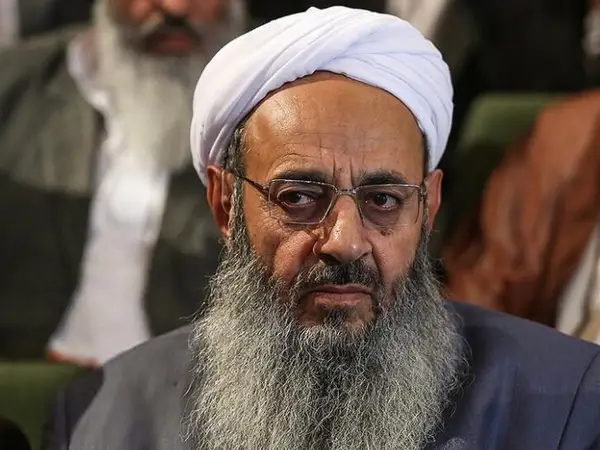A top Sunni cleric in Iran has called for an internationally monitored referendum, saying by killing and suppression the government cannot push back a nation.
During his Friday sermon, Molavi Abdolhamid, the Friday prayer Imam of Zahedan told regime leaders, “By killing, beating, and arresting, you cannot push back a nation that has been protesting in the streets for 50 days now.”
Addressing the government, he said “Now, the majority of people are unhappy. If you don't agree, hold a referendum with the presence of international observers and accept the result.”
By calling for a free referendum to decide the future form of government, Abdolhamid echoed a long-held demand by critics and opponents of the Islamic Republic. It marks a turning point for the Sunni leader who has long tried to survive in the dangerous environment of a Shiite religious theocracy.
Abdolhamid supported the presidency reformist Mohammad Khatami and moderate Hassan Rouhani in the past.
In 2021, he complained that neither had delivered on their promises of improving the conditions of the Sunni minority and giving them a share in the government and said he would vote for hardliner Ebrahim Raisi but was disappointed once again.
In October 2021, Abdolhamid who was known as a rights defender in the past said he hoped the Taliban “can become muscle for the Islamic Republic” and called on other countries not “to pre-judge the Taliban”, arguing that the group had changed, and its critics were exaggerating their shortcomings. Abdolhamid’s pro-Taliban statements led to criticism among Iranians and even among the Baluch people.
But when security forces killed scores of Sunnis during protests on September 30, Abdolhamid held Supreme Leader Ali Khamenei responsible.
The attack by the IRGC left more than 90 unarmed Baluch citizens dead as reported by human rights watchdogs in Iran and abroad.
Security forces once again opened fire at protesters with live ammunition while a huge crowd of people chanted “Death to Khamenei” and “Death to Dictator” during protests in the southeastern Sistan and Baluchestan following Friday prayers.
The incident followed weeks of brutal crackdown by the IRGC and other Iranian security forces on protesters in the provincial capital Zahedan, who have joined the nationwide antigovernment protests triggered by the death in custody of 22-year-old woman Mahsa Amini.
The government used violence against demonstrators in Zahedan, Saravan, Khash, Rask, and Sarbaz in the province on Friday after prayers.
Baluch activists announced that several people have been shot and killed in Khash and Zahedan by security agents. Reports say many more have also been injured.
Iran’s state-run media outlets say some protesters attacked the office of Khash governor and torched a police car while security forces fired tear gas and shot at angry demonstrators.
Gunmen on top of the Khash governor's building shooting at protesters
Friday coincides with the commemoration ceremonies for some other young people killed in previous protests.
After calling on people to keep up with their demonstrations on Friday, Iranian exiled Prince Reza Pahlavi once again urged them to mark the memory of those killed by the authoritarian regime as well.
He also called on leading democraciesto “further isolate and increase pressure on the regime, while expanding efforts to provide support to the people.”
Videos received by Iran International show people in Esfahan, Shahinshahr, and Karajheld gatherings to pay respect to those murdered forty days ago.
Iran has been gripped by nationwide protests against the rule of Supreme Leader Ali Khamenei for almost seven weeks, but the authorities keep blaming the protests on foreign countries claiming that “some limited numbers of youths are deceived by enemies”.
In its latest, Commander of Iran’s Revolutionary Guard Hossein Salami once again threatened “the Islamic Republic’s enemies” with revenge for their “interventionist and mischievous actions” on Thursday.
Salami had threatened Iranians October 30 not to take to streets anymore, but the people turned out in greater numbers to stage protests this week.
